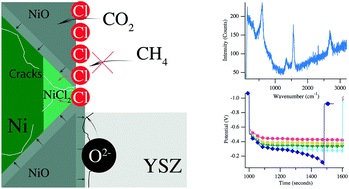Chlorine-induced degradation in SOFCs operating with biogas†
Abstract
Experiments described in this work examine degradation mechanisms of nickel-based anodes in solid oxide fuel cells (SOFCs) operating with a biogas surrogate and exposed to 110 ppm Cl (delivered either as CH3Cl or HCl). Chlorine present in green and synthetic fuels such as biogas and syngas can accelerate degradation of high temperature nickel anodes. Chlorine contamination has been studied in SOFCs where H2 was the primary fuel but little attention has focused on deleterious, cooperative effects that result from Cl-contamination in predominantly carbon containing fuels. Operando Raman spectroscopy is used to directly observe the anode's catalytic activity as evidenced by observable carbon accumulation, and electrochemical impedance and voltammetry measurements report on overall cell performance. Studies performed at 650 °C and 700 °C show that Cl immediately suppresses carbon accumulation and causes slow but steady cell degradation. Prolonged exposure to Cl results in abrupt and irreversible device failure. These results differ markedly from recent reports of Cl contamination in SOFCs operating independently with H2 and CH4.

- This article is part of the themed collection: 2017 Sustainable Energy and Fuels HOT Articles


 Please wait while we load your content...
Please wait while we load your content...